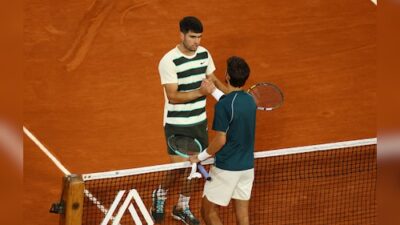Gukesh faced an unfavorable position against the 2018 Norway Chess champion Fabiano Caruana and attempted a last-minute recovery but lost track of time and made a blunder, quickly realizing he had lost his chances.
Gukesh extended his hand for a handshake, grimacing, closing his eyes, and covering his face with his hands in frustration.
This was a pivotal moment for the young Indian world champion to clinch his first Norway Chess title in just his second participation, following a tumultuous tournament where he began poorly but later achieved impressive Classical victories over Magnus Carlsen, compatriot Arjun Erigaisi, and China’s Wei Yi.
Defending champion Carlsen, who was the overnight leader with 15 points after round 9, concluded the tournament with 16 points, managing a remarkable escape against GM Erigaisi and securing a draw in the 10th round on Friday.
Gukesh finished third — matching his position from the 2023 edition — with 14.5 points, while Caruana took second with 15.5 points. Erigaisi claimed fifth with 13 points.
Erigaisi triumphed in the Armageddon tie-break against Carlsen following an unexpected draw by the Norwegian, but it ultimately impacted nothing as the five-time world champion had already secured a point with that stalemate to take the title.
As Gukesh quietly exited the arena after his loss to Caruana, Carlsen remarked that he had to “literally battle for his life” to remain in contention against Arjun Erigaisi.
A defeat for the Norwegian would have been disastrous, as the Gukesh-Caruana game was still ongoing, and a Classical victory for either would have thwarted his quest for a seventh Norway Chess title along with the prize purse of roughly USD 69,500.
In fact, had Gukesh managed to draw his game against the American Grandmaster, he would have secured the title—assuming Carlsen had lost his Classical match against Erigaisi.
According to the Norway Chess format, a Classical win awards three points, while a draw gives each player one point. A draw leads to an Armageddon tie-break to determine the winner, who receives an additional half point.
“I don’t know what to say, like I kind of urged him (Erigaisi) into specific action and then I obviously overlooked something significant. But I thought I was in a good position when he completely out-calculated me, and I just had to fight for my survival,” said Carlsen.
“It’s all about trying to find practical chances that keep the game alive, and it seemed that he (Erigaisi) became a bit anxious at one point, providing me with very good opportunities.” Carlsen acknowledged that part of his focus was on the Gukesh-Caruana game due to its considerable impact on his title chances.
”I realized that I might not need to win while watching the other game (between Gukesh and Caruana), and that understanding helped me,” said Carlsen.
“Yeah, of course, winning is a huge relief after such a day in the tournament. Obviously, my struggles have been well noted here, but at least I fought until the end, which I’m happy about. It’s been quite the ride, and we’re discussing classical chess.” Carlsen mentioned he wouldn’t be engaging in much classical chess in the future.
“Not a lot (of classical chess), for sure. I’m not saying this tournament would be my last, but I enjoy other forms of chess much more.” When asked if the title felt like a statement amid discussions of a rising new generation, Carlsen responded: “Had I won the tournament decisively, we might have had different conversations. But honestly, at least three players could have easily won this tournament, and I kind of stumbled into it. I don’t see it as much of a statement.
“It’s good to realize that, at least in parts of the game, I’m significantly better than the young talents trying to take over. It’s rare to see so many twists and turns… the quality wasn’t perfect, but there was still a lot of good chess as well.”
Anna Muzychuk wins women’s title
In the women’s section, overnight leader and two-time world blitz champion, Ukraine’s Anna Muzychuk clinched the title with 16.5 points despite losing in an Armageddon tie-break to India’s R. Vaishali in the final round.
Muzychuk’s draw in the classical game against the Indian awarded both players a point, while Vaishali gained another half point by defeating the Ukrainian in the Armageddon sudden death, finishing with 11 points.
Had Vaishali triumphed over Muzychuk — who went in with 15.5 points overnight — in the Classical game, she would have robbed the Ukrainian Grandmaster of three points, propelling Koneru Humpy to victory had the two-time world rapid champion also achieved victory over Chinese world champion Ju Wenjun in the Classical game.
Unfortunately, Humpy, who held 13.5 points overnight after round 9, could only draw with white pieces, securing one point. She added another half point by defeating Wenjun in the Armageddon tie-break to conclude with 15 points and a third-place finish.
.



